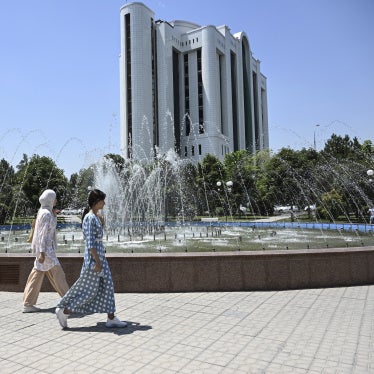(New York, February 26, 2004)—Uzbek authorities have arrested another human rights defender on what appear to be politically motivated charges, continuing Uzbekistan’s crackdown on civil society, Human Rights Watch said today.
On February 16, police in the central Uzbek city of Jizzakh arrested Muidinjon Kurbanov, chairman of a regional branch of the Human Rights Society of Uzbekistan (HRSU) and of a coalition of human rights organizations. Kurbanov is also chairman of the Jizzakh province branch of the opposition political party, Birlik (Unity). He was also arrested in 1998 on trumped-up narcotics charges, threatened with charges of religious extremism, and tortured in custody, leaving him permanently injured.
“Muidinjon Kurbanov is the latest victim in Uzbekistan’s relentless campaign to silence the voices of human rights defenders and the political opposition,” said Rachel Denber, acting executive director of Human Rights Watch’s Europe and Central Asia Division. “Given that the last time he was arrested the authorities injured him horribly, we are concerned he is at grave risk of torture. He should be released immediately pending an investigation of the charges against him.”
Last month police questioned Kurbanov about his human rights and political work, which suggests a political motivation to his arrest. On January 5, officers from the Jizzakh Province Department for Anti-Terrorism and Narcotics appeared at Kurbanov’s home, took him to the provincial Department of Internal Affairs, and questioned him for several hours about his activities in the two “unregistered” and “illegal” organizations. He had to reappear for further interrogation the next day, following a warrant.
There is no evidence that either Birlik or the HRSU is in any way involved in illegal activities, although the government disfavors their political and social criticism. On October 28, the Ministry of Justice informed Birlik that its registration application has been denied. A subsequent registration application was rejected in January. Birlik was the first independent pro-democracy political movement in Uzbekistan following the breakup of the Soviet Union.
HRSU has applied for official registration several times but has had its application rejected by the Ministry of Justice. In December, Kurbanov told Human Rights Watch that several human rights organizations had formed a coalition and that he was working to register regional branches of the coalition, but that several members had experienced pressure from the authorities to stop their work.
“Kurbanov’s arrest shows how the government can use the registration issue to harass individual defenders,” Denber said. “Anyone looking to evaluate the openness of civil society in Uzbekistan need only look at its treatment of human rights defenders and political activists to see that it has made no progress.”
Kurbanov was arrested on weapons and narcotics charges on February 16 after police conducted an illegal search of his property. In a chicken coop 50 meters away from Kurbanov’s house, police reportedly found a 28-mm. hunting gun, four 19-mm. bullets and 19.82 grams of kukpora, a narcotic plant used in traditional medicine. Kurbanov’s wife recounted that an unknown man had entered the courtyard at 11 p.m. on February 6 and ran away when she went to investigate. The next morning she found that the lock on the chicken coop had been opened, raising suspicions that the evidence was planted.
After his arrest, Kurbanov was held incommunicado for three days, during which he was interrogated, threatened and forced to sign a confession dictated by the police. Police questioned Kurbanov until 3 a.m., threatening that if he did not confess to the charges they would bring in his wife and take him to the basement where they would “show him” why he should confess. Police allowed Kurbanov to see his lawyer, Rukhaddin Komilov, only on February 20, after Komilov filed a complaint with the procuracy. Kurbanov remains in custody at the Jizzakh City Department of Internal Affairs, where he is at risk of ill-treatment.
In September 1998, law enforcement authorities in Jizzakh arrested Kurbanov on the basis of fabricated evidence of narcotics possession, held him incommunicado for three weeks, questioned him about his human rights organization, and tortured him with repeated beatings, causing one of his kidneys to burst.
In the past 12 months the Uzbek government released four imprisoned human rights defenders, but in addition to Kurbanov, Ruslan Sharipov, and independent human rights defender, remains in prison. Sharipov is serving a four-year prison sentence on charges of consensual homosexual conduct and sex with a minor following a trial far below minimal standards of justice and after credible allegations of torture. Human Rights Watch has repeatedly called for Sharipov’s release.








